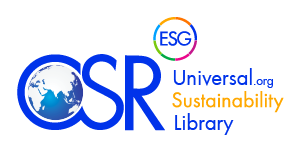The concept of Corporate Social Responsibility was first introduced widely in Vietnam in recent years through various activities of international NGOs and multinational companies. It is now one of the hottest topics in business, especially following a few environmental damages caused by factories in 2010. As the public shows increasing interest in social responsibility of business and also reacts strongly against those that fail to do so, both foreign and local companies start paying more attention to CSR. Nevertheless, CSR is still a very new concept and pioneers in this area are facing numerous challenges in executing CSR programs in Vietnam.
According to a CSR Survey conducted by SRI Vietnam, 90% of interviewees misunderstand the idea of CSR and related issues. In fact, Vietnamese consumers’ perception toward CSR as well as other ethical behaviors remains virtually unknown even though they have been suffering serious consequences caused by corporations during the past few years. 40% of interviewees consider CSR as a social obligation of businesses, which mainly consists of community works and events. While the level of awareness about CSR of Vietnamese is still low, the suspicion of the media continues to add up to the difficulty in dealing with general public. Lack of in-depth knowledge and professional research about CSR in Vietnam has led to incomplete information provided, which then turns into inaccurate news and articles that can influence consumers and governmental departments. CSR programs are often cited as PR (Public Relations) activities – another new communication concept in Vietnam that is frequently misinterpreted as negative as well. As a result, the main challenge is to raise the level of awareness of CSR among consumers, increase their appreciation of CSR and associate it in their choice of products to buy and to relate CSR with social concerns.
On the business side, lack of resources and commitment for CSR is the major cause for the current situation. Many local companies resist to change and still maintain their conventional thinking system, in which business performance is measured by simple and more visible metrics. They are more driven by short term incentives to make money, therefore using CSR as a branding tool is in fact more sensible to them. Even for companies that want to pursue a longer term, more sustainable approach to CSR, finding competent staff to overlook CSR activities is also challenging. In Vietnam, the number of people with professional training in CSR is very limited while the subject of CSR is not yet taught or even mentioned in most universities’ bachelor programs. On top of that, the attitude of businesses remains as an internal barrier to practice CSR at the moment. Many businesses in Vietnam believe that “CSR is only for big, multinational corporations”, or even “CSR is a luxury of the developed world, which is not relevant in a developing country”. Therefore, it is important to change their attitude from “CSR as a cost” to “CSR as an investment” in order to see more active CSR initiatives among local business community in the near future.
Nevertheless, the CSR picture in Vietnam is very promising. The government and enterprises are the two main players in the promotion of CSR in Vietnam, whereas the enterprises determine the success of CSR and the government promulgates policies, supervises the enforcement of regulations and provides information on CSR issues. Two main drivers for their rising interest in numerous issues of CSR are public awareness and pressure from importers. Recent scandals of factories committed to serious pollution in Thi Vai River, in particular Vedan company and various cases of health safety problems such as tainted milk distribution, toxic ingredients in consumer goods and pesticide remained in vegetables have been raising a greater concern on corporate social responsibility among consumers. As a result, CSR efforts related to daily life and health care would make more sense to Vietnamese consumers, regardless of their age, economic and educational background. Along with these environmental and health issues, Vietnamese export companies have been also encountering certification and standard problems when their foreign investors and buyers require them to take business practices based on respect for people, communities and environment. For instance, the U.S.-Vietnam textiles agreement included an obligation for the Vietnamese authorities to encourage exporting companies to implement CSR codes in return for access to the U.S. market.

Environment was a common theme for a lot of CSR projects in 2010. The most famous campaign is Toyota’s Go Green, an educational program on television that provides basic knowledge about various environmental issues, together with Go Green student club and many public events. Additionally, Panasonic also came up with “Eco Ideas” campaign and Canon with its eco-bags exchange activities. Many other big corporations in Vietnam have also played a vital role in incorporating the core value of CSR into their projects. Examples are Honda with “I love Vietnam” campaign, in which they use television to educate the public about road safety and transportation; sanitation education program for children living in mountainous areas by Unilever and an IT training program Topic64 by Microsoft, Qualcomm and HP.

Looking at Japanese companies like Panasonic, Honda and Toyota and the general perception of Vietnamese about CSR, we can see that education is probably the most reasonable approach for CSR activities at the moment. Common ground in culture and experience in education are the key advantages of Japanese organizations, which allow them to focus on both students and local businesses. While the main channels to approach Vietnamese companies are through conferences and occasional corporate training, it is much easier to reach students. Educating Vietnamese students during their university days could help change their mindset early and hence benefit Vietnamese businesses at the core value. Japanese organizations should consider both formal education through incorporating CSR courses in business subjects and informal education such as student clubs, training programs and communication campaigns aimed at student communities. Each channel can add value in its own way.
In a country like Vietnam where CSR is a brand new concept even to people working in business, Japanese organizations should slowly approach the issue by first raising awareness through education. In addition, companies with comprehensive CSR programs and best practices should be encouraged to share their experiences and to set a more visible guidance for large corporations and small and medium-sized enterprises (SMEs) in Vietnam.
About the author

Pham Vu Thuy Chi
Chi is a specialist in services marketing and business development with a strong focus on consulting and design of customer relationship management systems for multinational companies and international NGOs in Vietnam.
Chi is working at GreennoCom as marketing manager ( GreennoCom is a professional service firm engaged in communication, consulting and design services with the specialty in the green business and green building industry in Vietnam). Recently, Chi has been focusing on assisting companies and NGOs in Vietnam with business skills and operation improvement.She teaches undergraduate course on marketing, business communication at Hanoi School of Business in Vietnam. She has been actively engaged in the development and integration of CSR elements into her teaching curriculum.
Chi gained her undergraduate degree in Accounting at University of Sydney and her master degree in Marketing at University of New South Wales, Australia.
Edit by: Do Thi Thu Thao
Background Research: Dang Thi Hai Bang

